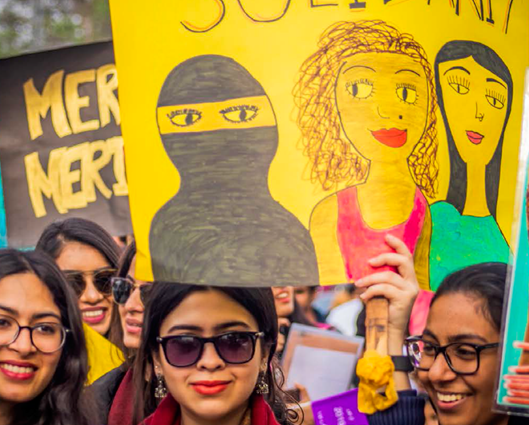In 2019, the authorities tightened their control over freedom of expression, failed to uphold commitments to legislate against torture and enforced disappearances and prevailed upon shrinking the space for civil society to defend and promote human rights, Amnesty International said as the human rights organization released its annual report on events in the Asia-Pacific region.
Human Rights in Asia-Pacific: Review of 2019 published today by Amnesty International delivers the most comprehensive analysis of the state of human rights in the world’s largest continent.
For Pakistan, Amnesty International found that enforced disappearances continued relentlessly, as did cases of torture, violence against women, media censorship and the harassment of ethnic and religious minorities. Despite these restrictions, Pakistanis still took to the streets in large and peaceful demonstrations in support of the rights of women, students, Kashmiris and against enforced disappearances throughout the year.
“It has become increasingly difficult to fight for human rights in Pakistan at a time when the authorities continue to forcibly disappear people, censor journalists, crack down on peaceful demonstrations and enforce repression through draconian laws,” said Omar Waraich, Deputy South Asia Director at Amnesty International.
“But 2019 also saw Pakistanis rise up and demand their rights, taking to the streets against enforced disappearances and extrajudicial killings, for women’s rights and students’ rights, and for climate justice.”
Enforced disappearances continue with impunity
Victims of enforced disappearances included political activists, students, journalists, human rights defenders and Shi’a Muslims, particularly in Sindh and Balochistan provinces. Even as hundreds of disappeared people were released throughout 2019, no one was held to account for even one of them.
The promulgation of the Khyber Pakhtunkhwa Actions (in Aid of Civil Power) Ordinance contradicted the government’s stated commitment to criminalize enforced disappearances. The legislation gives security agencies a range of abusive powers, including the power to detain people without trial or charge in the province.
“Enforced disappearances have scarred communities and destroyed families across Pakistan, with complete impunity. It is time that this cruel practice is finally, once and for all, criminalized,” said Omar Waraich.
Freedoms under threat
Political activists and journalists were targeted and charged under draconian laws, including the Prevention of Electronic Crimes Act (PECA), the Anti-Terrorism Act, and sections of the Penal Code on sedition and defamation. Media workers reported that they were experiencing a growing culture of censorship, coercion and harassment by the authorities.
Journalists faced charges such as “cyberterrorism”, “spreading false and abusive information”, and hate speech.
Every effort must be made to protect people’s freedoms of expression, assembly and association as enshrined in Pakistan’s constitution as well as in its international obligations
Omar Waraich
The authorities intensified the crackdown on the Pashtun Tahaffuz Movement (PTM), which campaigns against human rights abuses – arresting and arbitrarily detaining dozens of its supporters, subjecting them to surveillance, intimidation, prosecution and threats of violence.
In February, Arman Luni, a PTM activist from Balochistan, died after being beaten by police officers following his participation in a peaceful protest in the Lorelai district. In the same month, Mohsin Dawar and Ali Wazir, parliamentarians and PTM supporters, were detained as they led a procession. At least 13 people were killed, including three PTM supporters, when the procession was fired upon.
Gulalai Ismail, a woman human rights defender who campaigned against violence against women and enforced disappearances, was charged with sedition, terrorism and defamation in May. In August, she fled to the USA. Her family faced serious intimidation by the law enforcement authorities.
The blasphemy laws continued to be used to harass individuals and enable human rights violations in Pakistan. In December, Junaid Hafeez, a professor accused of blasphemy, was sentenced to death by a court in Multan. He has been imprisoned since 2013, spending much of that time in solitary confinement.
“Every effort must be made to protect people’s freedoms of expression, assembly and association as enshrined in Pakistan’s constitution as well as in its international obligations,” said Omar Waraich.
Climate change takes centre stage
Climate change and its impact on Pakistan featured more prominently in public discourse. Pakistan’s agricultural economy continues to be vulnerable to climate change. This vulnerability has direct impact on the rights to water and food of millions around the country and with that, the rights to health and life. This growing concern was reflected in the country’s first ever nationwide climate strike in September.
In November and December, air pollution levels became hazardous in major Pakistani cities, particularly Lahore. Schools were forced to close for at least three days due to the smog and there was a sharp rise in respiratory illnesses. The government announced it would take special measures to address the crisis, including improving fuel quality and transitioning to electric vehicles.
“The government of Pakistan needs to do much more to adequately address the climate crisis, and their commitment to do so is an encouraging sign. People’s health, and even their lives have been at risk from smog and climate change for too long for authorities to just wait for the storm to pass,” said Omar Waraich.


